- Home
- Dusty Richards
Dead Aim Page 2
Dead Aim Read online
Page 2
He made miles across the plains, which was an endless track following the sun westward. Long stopped to camp with wagon trains and freighters, to talk to people, eat some woman’s sweet desert, and then push on. His separation from Harp he found was the hardest part of his exploring adventure. His brother was home building the O’Malley family ranch, maybe an empire after their last big cattle sale in Abilene, and he wasn’t back there in Texas to help him. His conscience bit him over his self-centered plans to satisfy a whim.
A week later he rode up on a small family wagon outfit in late afternoon and spoke to the gray-haired man who was in charge. They wore shabby clothes, looked poor, and their outfit was patched.
“My name is Long O’Malley.”
“Get down. Set a while. We have no coffee but we’re friendly.”
“You have a coffeepot. I have coffee we can boil.”
“Woman, this fine man has coffee to share.”
A blank-eyed teenage girl appeared and smiled. “I kin fix it.”
“Well boil some water and get things going,” the man said as three young men came in, sat down, and stared at him.
“Boys, this is Long O’Malley.”
They nodded.
“He has real coffee to share. Ain’t no burnt barley. Nice, ain’t it?”
They only nodded.
“Them his horses, Paw?”
“Yes, he rode in here a short while ago.”
“Nice horses you ride.”
Long agreed. “They’re good enough.”
The oldest one stood up. “You must be rich.”
“I’m a rancher in Texas.”
“Paw, I think we need them horses.”
“Why, don’t insult our guest, son.”
“I think—”
His words stung Long. His back up, he said, “Go sit down. You’re not taking my horses or threatening me.”
“Why, mister—”
“Sit down or I’ll fill you full of lead. Move.” The Colt in his fist, Long slowly backed up. He lifted his rein and stepped in the saddle. His gun ready for any move they made. Then he guided his saddle horse with his knees so he could get the lead rope and throw it over his packhorse’s neck. All the time he kept them in his sight. Then he whirled the bay with his body and holstered his gun and left. The packhorse broke to go with him and galloped beside his stirrup. They went west.
There were all kinds, good and bad people, on the road west. Next time he’d look them over better before he stepped off his horse. This open country certainly could be dangerous. All the scum of the earth rode the western expansion wave. What did they say? No law, no restraint west of Abilene. He was beginning to believe it.
He met three travelers two days later; two of the men wore suits. The other was a cowboy who was their guide and camp cook. His name was Theo and said as he shook Long’s hand that he originally came from Fort Worth. The other two men were Pinkerton detectives.
Atmel Hunter was the head guy, and he talked very eastern. Kenneth Loren was the younger suited man with him. Around the campfire Hunter told him their purpose and showed Long a couple of sketches.
“This guy, Arthur Chapman, set up this cattle drive down in Texas no doubt much like you and your brother did. Folks around Waco where he lived obviously thought he was another drover who could deliver their cattle to the Kansas market and cash in their livestock, then pay them. Arthur and his brother Kenneth and a man named Miles McCracken made up the Brazos Cattle Company. They took two herds of steers north . . . most all were cattle they had contracted to sell for others. Approximately four thousand head. They sold them and then gave each cowboy twenty bucks to go get drunk on. And that night while the hands partied they took a powder. Isn’t that the word they gave us?”
Amused by the story, Long nodded he understood. “Yes. And no doubt they had over three hundred thousand dollars in their pockets.”
“Exactly. One of those punchers stranded in Abilene without his pay wired home. The ranchers got the word and hired the agency to find the felons. You haven’t seen those men’s faces we showed you?”
“No. I never saw them. They must be smiling though.”
Hunter frowned. “What do you mean by that?”
“Lordy, I had that much money I’d smile all the way to San Francisco.”
The other two laughed.
“I am sorry but I find nothing funny in thievery. But I figure that must be one of the richest robberies in history,” Long said.
“It very well could be.”
“Are there traces of them being on this road?”
“Yes, we have evidence they passed this way.”
“How much reward will be paid for them?”
“If you can recover any of their money, it will pay one quarter of the amount recovered.”
“Hunter, you know if some hardcases learn they are that valuable, they will do them in and keep the money.”
“Oh, no doubt. That is why we are on horseback. Other agents from our Denver-based office are coming this way to head them off.”
“Well good luck. I bet they aren’t the only ones absconded with cattle proceeds in Abilene.”
“No. The agency caught two such men a few weeks ago in Saint Louis and recovered half the proceeds remaining.”
“That much money and only half of it remained in that short a time? What did they do with the rest?”
“Obviously spent it on wine, women, and song.”
Long shook his head. “That must have been some party.”
“I’d enjoy being there,” Loren said.
“My brother and I took a herd to Sedalia last year at the very end of the war. At the time that country wasn’t even over fighting the war. We had the cattle sale money transferred back to a Texas bank, and we paid all the people involved. But I could see how someone could slip off with that money and be gone a long ways from home in no time.”
“Exactly. If that cowboy had not wired home and told what happened, they would still be scot-free. They could have been to the west coast before anyone discovered them missing.”
“You think you will run those three thieves down riding horses out here?” Long asked them.
Hunter nodded. “Yes, we might pass them riding in a coach.”
“Hey it makes work for me,” Theo said with a grin.
Long nodded he understood. “I see any of them, I’ll try to get word to you.”
“Being part Indian, do you belong to a tribe out here?” Hunter asked.
He shook his head. “My father was a Cherokee. He died before I was born. My stepfather raised me. He’s Irish. We lived on the edge of the Comanche lands down where I grew up in Texas. I know little about the Cherokee except their reservation is in the eastern part of the Indian Territory.”
Hunter nodded. “You sound like you are well educated.”
“My mother saw to that. My half brother is a real businessman.”
Hunter shook his head. “When you first spoke I expected broken English, not an educated southern drawl.”
“Lots of people are surprised at my speech. Thanks for sharing your meal with me. If I may I’ll bed down here tonight and go on in the morning.”
“Sure, go right ahead. What is it so important for you to see the Rocky Mountains?”
“Have you ever had something you really wanted to accomplish in your life? That’s my desire. To finally really see them.”
“I have been to Denver several times. They are just mountains usually snow-capped.”
“Good. Then they are still out there waiting for me.”
They laughed and Long did, too.
Nice to sleep near some real people and talk with them about intelligent things. He shared his coffee with them. They had another brand and it didn’t taste as good as his Arbuckle.
Loaded and saddled, he left them and rode west. He had to detour mid-day for a passing buffalo herd. Then he returned to the road that ran parallel with the Platt River. Rolling hills lined the ro
adway, and signs of homesteaders in newly erected shoddies could be seen along the way.
His plans were to later return east on the Arkansas River route, which lay south of there. This route had begun showing the wear and tear of a much used way west. In late summer most of the land boomers were already out west. The late ones faced harsh wintering somewhere on the plains. That worried him every time he thought about their future. Not a problem for him but they had a place in his mind—he would never forget, as a boy, his family’s hard long wagon move from Arkansas to Texas.
He stopped mid-day at a road ranch trading post named Logan’s Ranch and Post. Such places had several buck skinners hanging around. These were the men who dealt with the Indians in fur trade, whiskey, and arms sales. They carried Bowie knives and liked Pennsylvania-made single-shot rifles, feeling they were more accurate than cartridge ones. Most of them had squaws for wives. For fun and entertainment they held wrestling matches, and hatchet and Bowie knife toss competitions.
Long could sink an ax in a tree at a good distance. In Texas he’d won his share of contests. So when he rode up to Logan’s Ranch and Post he saw the setup of such a contest opening and about to start. He wanted into the competition.
“How much to enter?” he asked a bystander.
“Ten bucks. You got it?” another man said, holding a handful of money.
“Here.” He handed the man two five-dollar bills. “I need to hitch my two horses.”
“I can hold them for you.” The barefoot boy in short overalls held out his hand.
“Good,” he said, and dismounted. “What is your name?”
“Stanley O’Connor, sir.”
“Long O’Malley. They’re gentle. Don’t let anyone steal them, and let them graze.”
“Oh, I’ll take good care of them.”
“I trust you.” He left the youth and went through the crowd of onlookers and nodded to the bearded men lined up for the contest.
A few competitors shook his hand and welcomed him.
“Pick you a hatchet,” one guy said, indicating the crate full of shiny new axes.
He hefted a few. They were lighter than he liked, but they were sharp edged for manufactured ones. But all the competition had to use them, so they were equally at no more advantage than he would be.
“From the looks of your clothes you must be from Texas?” the buck skinner standing beside him asked.
“Yes. Camp Verde west of San Antonio.”
The man chuckled. “Man, you are a long damned ways from home.”
“Yes.”
“Line up. Watson is the judge. Get in line. Give your last name to the clerk when it is your turn.”
“Wilkins,” the first man said as he stepped up to the line drawn in the dirt. He drew back and the ax swished through the air and bounced off the large post set up as the target.
“Next?”
“Arnold.”
His hatchet was deflected.
“Cole.”
His ax barely stuck and then fell off. The crowd awwed.
“Newland.”
Long expected this next big man to split the post into two.
The giant reared back and roared like a mad grizzly bear. His ax stuck solidly in the post. A cheer went up and the onlookers grew in numbers.
“Dawson.” His ax went wild.
Another struck the post by Newland’s and fell away.
It finally came to O’Malley.
He gave his name, stepped up, and studied the post and where to hit the post to not strike the already sunk-in hatchet. With a step forward the ax flew with all his might, and it made a responding clunk and was inches hard sunk next to Newland’s in the post. There was applause.
“We have a tie and three more men to toss.”
“You Injun?” his large competitor asked him.
“Part. But my father died before I was born.”
The big guy laughed. “Hell I knew right off when you said your name you wasn’t raised in some old tepee.”
“No, I wasn’t. What will they do next?”
“Take our axes out and step off five more feet.”
“Good luck,” Long said, and walked back behind the new line.
Several shook his hand and they told him Newland usually won these contests. He nodded and smiled. In Texas he usually won such competitions. But anyone with luck and the skill on his side could win at any time.
He chose another ax and Newland won the coin toss to go first. The big man reared back and the hatchet swooshed through the air. It barely caught in the top of the post but held.
Long nodded at his competitor, then he reared back and flung his ax. It sunk hard in the post’s center and they applauded.
“Newland, you want another toss? Your hatchet is in the post . . .” the man judging the contest asked.
The big man shook his head. “Texas here won.”
The crowd cheered.
Long went over and shook his hand.
“Texas, if I ever get in a nasty fight I want you on my side.” Newland’s blue eyes twinkled.
“Newland, if I am close I will be at your side.”
“Get your cup,” one guy said, elbowing his way in the group. “We got us some real lightning here.”
The man carried around a gallon-size crock, pouring some liquor in each cup. Long had his ready and knew it was respectable to taste some though he wondered how many severed rattlesnake heads they had put in the batch making the hooch?
“Here’s to the West,” someone toasted.
“Yeah!” went up the shout.
After some cheers, a woman dressed in buckskin came and pulled on his sleeve. “I gots some fresh buff roast, mister. These louts will drink till they fall down. Come and eat with us.”
“Thank you, it sounds great. My name is Long.” Tossing the rest of his drink, he hooked his cup back on his belt.
She had his arm and hurried him along. “Mine’s Ruthie.”
“Wait. Wait. I have your money,” the official said, calling after him.
He accepted the money and counted it out. One hundred eighty dollars.
“Is it all there?” she asked, looking closely at the exchange.
“Yes. And thank you,” Long said to the man, folding the money into a stack to shove in his pants pocket. He asked her, “What is your name again?”
“Ruthie.”
“Mine’s Long.”
The sharp-faced woman in her twenties looked him up and down. “You told me that already, and you damn sure are long.”
He chuckled and then joined her hurried steps to the cooking area.
“Sit down. I’ll cut you some good slices.” Another attractive brunette was in his face. “Coffee or water?”
“Coffee.” He unhooked his tin cup from his belt for her.
He sat down and soon was served a heaping wooden slab piled with great smelling slices of rib roast. A hot French bread loaf soon joined it. That and a steaming bowl of meat juices to dip torn off pieces of the bread in. Long shook his head in amazement. “This is wonderful. Thank you so much.”
“Eat it then,” a chubby white woman said.
“Won’t you all join me?” He swept his arm for them to sit with him.
“Damn right,” his guide Ruthie said.
“Where do you live?” one asked him as if anxious to know more about him.
“Texas, west of San Antonio.”
“What are you doing out here?”
“Just looking around.”
“You have a wife?”
“No wife.”
Hands on her wide hips she demanded, “Are you telling us the truth?”
“I swear I have no wife.”
“I have a daughter,” another said to get it in.
“Oh, I better not get one right now. I may have a hard time getting myself back down there let alone to have a wife along. Thanks.”
They laughed.
“Ladies, this is the best meal I have had since I rode out of
Abilene.”
One of the darker skinned women asked him with one eye shut to stare hard at him, “Do you have a ranch?”
“Yes. I imagine my brother has bought me a lot more land since he got home.”
“Is he married?”
“Yes. Harp is happily married and has a new son.”
“When will you go back to Texas?”
“After I see the Rocky Mountains are my plans now.”
“You need a cook to go along?”
“No, ma’am.”
So he whiled away the afternoon talking to these wives and daughters, and they grilled him hard. Hard enough he wished he had Harp there to talk for him.
Full of good food, he and his young helper unsaddled the horses. He had let them graze and drink. Then they hobbled them for the night nearby and he paid him a quarter.
Later he spread out his bedroll close to his animals and at sundown he crawled in his bedroll to sleep. The half-moon was hung high when one of the camp females whispered in his ear, “Let me in.”
“Does your husband know you are here?”
“He died six months ago.”
“Then he can’t kill me.”
She giggled. “You’re funny.” With that said, under the starlight she shed her dress and he let her quickly under the covers.
CHAPTER 3
The Denver-destined road split in western Nebraska. One route went to Denver, the other to Fort Laramie. He decided to take the Denver route. He’d been traveling over three weeks and met many forms of people on the trail as well as some generous women. Not to have Harp to talk to left him a big space in his being alone as an individual in this prairie world. No woman had turned his head though he found some comfort in the volunteers’ conversation and their individual nocturnal sharing.
That evening he was camped by himself on the Platt River. With his survival skills, plus some gut line tied on a willow pole with a small iron hook and a fat grasshopper, he caught some trout earlier and fried them. His camp was set up well off the main road, and when he noticed his nearby grazing horses look up at something, he saw, on the far bank, two riders preparing to ford the river directly across from him.
One wore a felt hat and the other rider had braids. Her horse was on a lead rope. The Platt there was swift and deep enough at that spot he decided the horses might have to swim the middle to cross it. Both riders made the ford and soon had their dripping mounts shaking water on the gravel under them. The second horse found his footing and came up beside her companion. The braid-headed girl could sure ride. She stayed on, bareback, during the crossing.

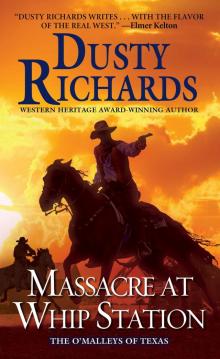 Massacre at Whip Station
Massacre at Whip Station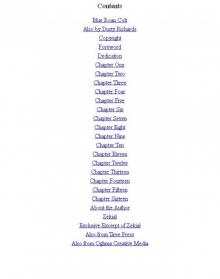 Blue Roan Colt
Blue Roan Colt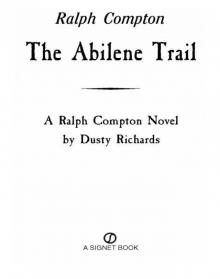 The Abilene Trail
The Abilene Trail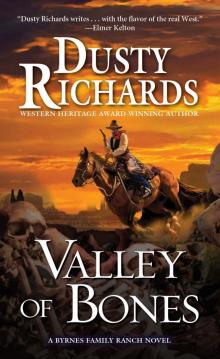 Valley of Bones
Valley of Bones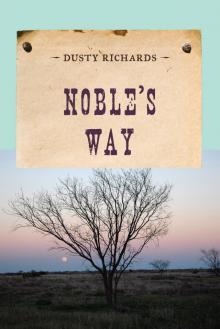 Noble's Way
Noble's Way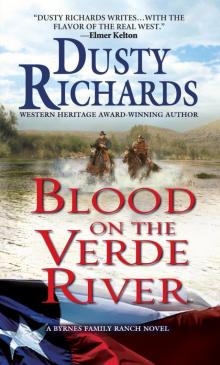 Blood on the Verde River
Blood on the Verde River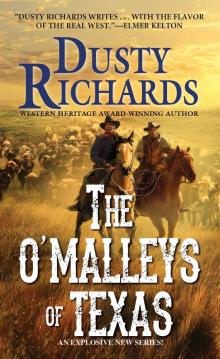 The O'Malleys of Texas
The O'Malleys of Texas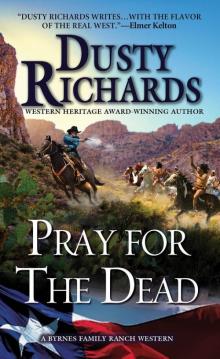 Pray for the Dead
Pray for the Dead Arizona Territory
Arizona Territory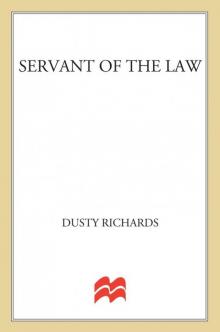 Servant of the Law
Servant of the Law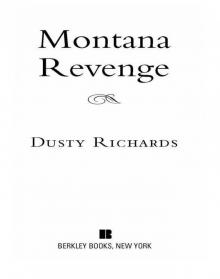 Montana Revenge
Montana Revenge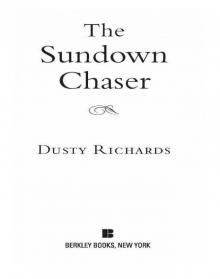 The Sundown Chaser
The Sundown Chaser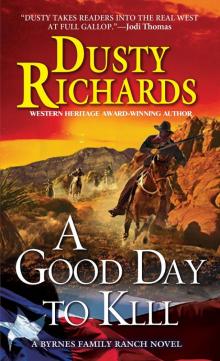 A Good Day To Kill
A Good Day To Kill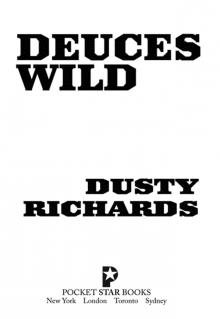 Deuces Wild
Deuces Wild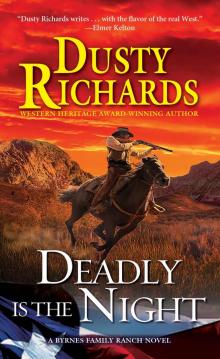 Deadly Is the Night
Deadly Is the Night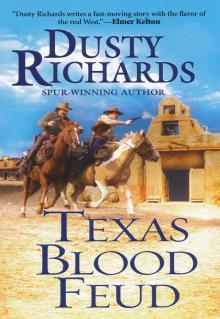 Texas Blood Feud
Texas Blood Feud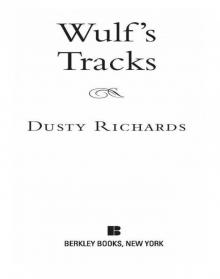 Wulf's Tracks
Wulf's Tracks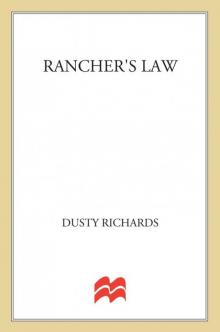 Rancher's Law
Rancher's Law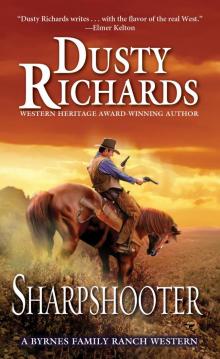 Sharpshooter
Sharpshooter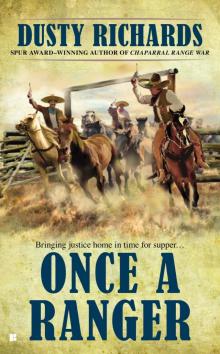 Once a Ranger
Once a Ranger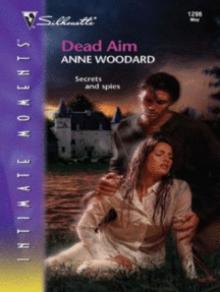 Dead Aim
Dead Aim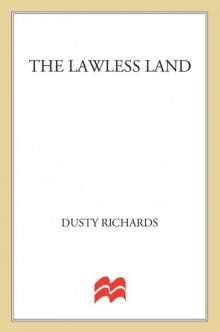 Lawless Land
Lawless Land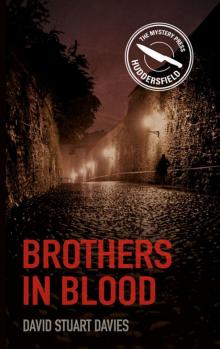 Brothers in Blood
Brothers in Blood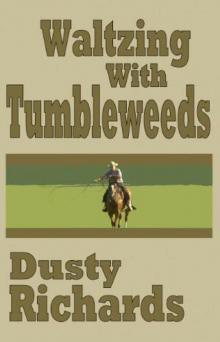 Waltzing With Tumbleweeds
Waltzing With Tumbleweeds